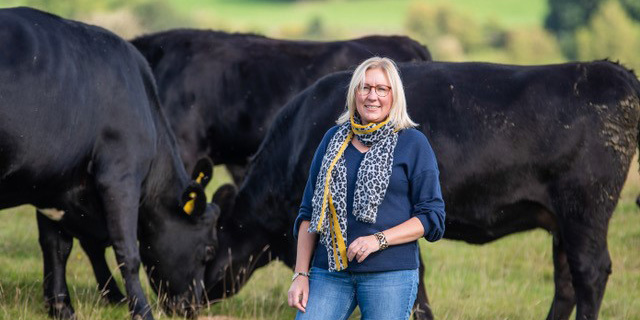
23 March 2023
Farming runs in the DNA at Rawfoot Farm, with one side of the family able to trace their roots through many generations of farming families, stretching back centuries, and often no more than a valley or two away. Laila and Richard themselves have been farming Rawfoot’s 400-acres for 20 years, taking over the tenancy from Richard’s parents.
Laila and Richard are very much at the forefront of a new breed of farmer; working the land guided by a philosophy that wants the best for livestock, nature and farmer.
A traditional upland Lake District farm, Rawfoot moved away from local indigenous breeds that would not be economical without subsidies, to rearing Highlander sheep, chosen for their mothering instincts and ability to live outside with little or no farmer intervention (less than 1% need help). This breed is more sustainable; less reliant on supplements and bought-in feed, thus enjoying greatly improved animal welfare, and are perfectly suited to the traditional farming methods of the Lake District. The system of hefting – allowing sheep to graze the fells and common grounds – that has taken place across the Lake District for over 1000 years.

Equally vital for a regenerative farm is biodiversity and soil quality. Richard and Laila have adopted mob grazing with their sheep. Rotating their flocks from field to field and then on to another, allowing their pastures to rest and recover, and for nature to flourish. In tandem, they have encouraged the growth of herbal leys (grass pastures). Rawfoot sees up to 15 different species of grasses, herbs and wildflowers including red and white clover, yarrow, chicory and ribwort plantain. More flowers mean more pollinators like bees and butterflies. More pollinators mean more birdlife. Herbal leys have taller grass swards with long roots – up to a couple of feet! Longer roots makes the soil better and more fertile, adding nitrogen naturally and capturing and storing carbon. This good soil means more water can be held, and reduces surface runoff.
Rawfoot’s livestock’s diet is a healthy one, rich in protein and minerals; its pastures too are top quality, working harmoniously for nature and farm. This approach extends to the field boundaries too. Hedges are not cut and trimmed, but allowed to grow naturally. Hedges at full height provide safe cover for nesting birds. Protection from predators together with a varied menu of bugs, encourages a variety of birdlife to populate the farm. Together, these actions help Rawfoot on its journey to net zero.

As well as their 900 sheep, Laila and Richard have 150 cattle; half are Angus and half Wagyu. The Wagyu breed originates from Japan and its meat is highly prized. Its beef is highly marbled, with high levels of omega fatty acids, and a unique tender and buttery flavour. It is really the Rolls Royce of beef. Rearing Wagyu on Rawfoot’s super pastures results in the highest quality product, with production mileage only within the confines of Lake District National Park. Just a small number of Wagyu are butchered each year and the cuts of meat are only available frozen from Rawfoot’s on-site farm shop. Customers are encouraged to drop by with their iceboxes and stock up. There’s Highlander lamb and Gloucester Old Spot pork also available.

Rawfoot Farm’s regenerative farming is the living representation of the Lake District’s World Heritage story. Retaining some of old traditional fell-top farming methods, together with new thinking and breeds, and a drive to conserve and improve the land and wildlife which they are custodians of.
Nestled around Haweswater wander a herd of highly prized Wagyu beef cattle. Free to graze the rich pastures of Bampton valley, Rawfoot Farm’s cattle enjoy the abundant wildflowers, herbs and grasses, and zero antibiotic supplements, making their meat tender, tasty and the best quality. Why not treat yourself to some top-end beef, available only from the farm shop. Just bring your ice box! Rawfoot can be found at Bampton, near Haweswater CA10 2QZ (07879 657621).